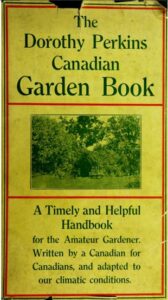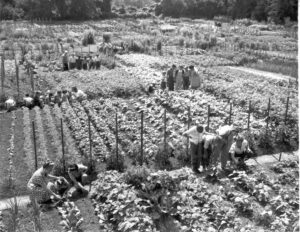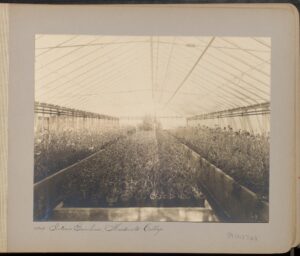Social distancing has made me long for two things: the company of other people, and time outside in nature. In the last month or so, I have started seedlings and am planning to plant a small balcony garden near the end of May. It seems that I am in good company! Seed sales have been so high this spring that some seed companies are having trouble meeting demand.[i] So, whether you are staying at home to garden, or are heading to a community plot to get your hands dirty, here is a quick look at some gardens in ROAAr’s collections.

Dorothy Perkins, The Canadian Garden Book (1918). McGill Rare Books/Special Collections SB450.36 C2 P47 1918.
Most settler gardeners in Canada have historically taken their cues from their European ancestors, though Indigenous peoples cultivated the land for millennia before the arrival of colonists. In her 1918 Canadian gardening book, Dorothy Perkins extolls the virtues of English gardens and exhorts her fellow gardeners to get out and start planting flowers. “Relax!” she writes. “Your threadbare, over-strained nerves are crying out for relaxation. Help create a Canadian garden picture!” Though Perkins was more of a flower enthusiast – one varietal of rambling rose still bears her name – she devotes her last chapter to vegetable gardening. Maintaining a kitchen garden or working in a community garden was considered a patriotic act during the First World War, and the stories in that final chapter offer as many historical insights as they do gardening tips.

Young children visiting NDG Garden Club gardens during Victory Gardens Week, 1945. McGill University Archives, Photo Collection, PR025838)
A similar movement emerged during World War II, as “victory gardens” began to be planted across the country. The goal was to make communities as self-sufficient as possible, liberating transportation and other industries to focus on the war effort. The Canadian Encyclopedia reports that there were an estimated 29,200 victory gardens across Canada in 1944.[ii] Between 1937 and 1961, an organization called the Community Garden League of Greater Montreal offered community garden plots to families with unemployed heads of household. They also administered the gardens, arranged for canning of surplus food, and organized competitions and garden shows. The archives of this organization are held in the McGill University Archives as part of MG2079 – Montreal Parks and Playgrounds Association/Community Garden League of Greater Montreal Fonds (see a description of the archive here).
These days, the threats to food security come on many fronts: climate change, agricultural monopolies, diminishing genetic biodiversity, and so on. In response, there is a growing local food movement that encourages gardeners to grow their own food and save their seeds. The City of Montreal recently announced the reopening of community gardens, along with a new program at the Montreal Botanical Gardens to produce food for the community, and the allocation of funding to Cultiver Montreal, a local organization that promotes agriculture in Montreal.[iii] Parallel to urban gardening initiatives, there are many libraries that run seed-sharing programs.[iv] These seed libraries give out packages of seeds to library members for free, often sharing regional varietals that cannot be purchased from large seed companies. They ask only that at the end of the growing season gardeners save their seeds and give some back to the library in order to create a self-sustaining community resource. McGill’s Macdonald Campus has its own seed library that offers up to 25 free seed packets per person to members of the McGill community. You can order seeds online and have them delivered to any McGill library branch. Then, at the end of the season, you are encouraged (but not required!) to gather some seeds from the plants you’ve grown and return them to the Macdonald Campus Library. While the seed library is currently closed due to COVID-19, you can access their gardening tips and resources here.
To learn about the early history of settler gardening in Upper Canada, I suggest Eileen Woodhead’s Early Canadian gardening: an 1827 nursery catalogue. For more on victory gardens, check out Ian Mosby’s Food will win the war. To read more about seed libraries, take a look at Cindy Conner’s Seed libraries and other means of keeping seeds in the hands of the people.
By Aeron MacHattie, Archivist, Rare Books and Special Collections
[i] Baker, Rafferty. “Pandemic panic sees seed sales spike.” CBC News, Apr. 7, 2020. https://www.cbc.ca/news/canada/british-columbia/seed-demand-spikes-amid-pandemic-1.5524298 (Accessed April 30, 2020)
[ii] “Victory gardens.” The Canadian Encyclopedia, April 25, 2016. https://thecanadianencyclopedia.ca/en/article/victory-gardens-editorial (Accessed May 4, 2020)
[iii] Luft, Amy. “Montreal rolls out plans for community gardens, urban agriculture to help feed local residents.” CTV News, April 30, 2020. https://montreal.ctvnews.ca/montreal-rolls-out-plans-for-community-gardens-urban-agriculture-to-help-feed-local-residents-1.4919385 (Accessed May 4, 2020)
[iv] David-Young, Katherine. “Why so many public libraries are now giving out seeds.” Atlas Obscura, March 27, 2018. https://www.atlasobscura.com/articles/public-seed-library (Accessed May 4, 2020)














Leave a Reply
You must be logged in to post a comment.